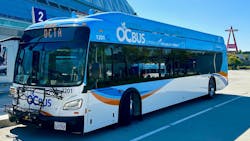OCTA selects INIT to develop rider validation system for OC Bus System
The Orange County Transportation Authority (OCTA) has selected INIT Innovations in Transportation, Inc., as the contractor to develop and implement an innovative and more equitable rider validation system for the OC Bus system, offering passengers more convenience and easier access to discounted fares.
The decision to contract with INIT follows a rigorous evaluation process that began in February, with the goal of enhancing the passenger experience, optimizing the fare payment process and ensuring flexibility to accommodate evolving technology.
The total budget for the contract is $11.6 million. The agreement includes a five-year initial term, with the option to renew the contract for an additional five years to ensure the long-term effectiveness of the rider validation system.
“Innovation is a key factor of what we do at OCTA and this rider validation system is a great example of how we are using technology to meet the evolving needs of riders and to improve the customer experience,” said OCTA Chairman and Mayor of Yorba Linda, Calif., Gene Hernandez.
The rider validation system will improve the way passengers pay to ride the bus by introducing smart cards embedded with chips. The smart cards will enable passengers to store fare value in a centralized account, allowing customers to autoload payments and protect their balances. Riders will also be able to manage their smart cards through a website and use a virtual smart card on their smartphone or other mobile device. Additionally, riders can choose to pay with cash or credit card through an expanded network of in-person retail sites, enhancing convenience and accessibility for all riders.
Another important feature of the new system will be fare capping, a policy recently adopted by several other leading transportation agencies that charge riders as they travel and caps the total fare amount for daily and monthly periods. OCTA says fare capping will make fare collection more equitable and will simplify the fare structure, eliminating the need for passengers to pay full cost for monthly passes in advance.
The implementation of the new rider validation system, expected to be in place by 2025, will significantly reduce the reliance on onboard cash payments, leading to cost savings associated with cash collection. The removal of magnetic-stripe components from fareboxes will reduce equipment maintenance costs and expedite bus boardings, improving efficiency.
